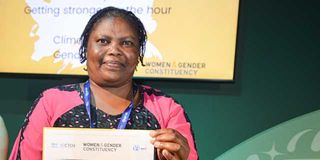How Kenya’s indigenous women won global award at COP28

Ms Naiyan Jebet Kiplagat, the leader of Paran Women’s Group in Narok, displays a recognition certificate after the group won the Gender-Just Climate Solutions Awards at COP28 in Dubai, UAE, on December 5.
What you need to know:
- Group has been conserving the Mau Forest and received €5,000 (Sh830,956) for their efforts.
- They address gender inequality issues and climate change effects.
Kenya may not have taken centre stage at the COP28 in Dubai in the United Arab Emirates.
However, a little-known women's group in a remote village in Narok South, more than 3,500km from Dubai, has catapulted the country to the apex of the summit.
Paran Women's Group won the top award in the non-technical solutions category. The women, who have been working to conserve the Mau Forest, got an early Christmas of €5,000 (Ksh830,956).
The 3,000 women from 64 groups comprising indigenous groups from Ogiek and Maasai communities, were recognised for planting indigenous trees in the Mau Forest and practicing climate-smart agriculture.
They target to plant more than 150,000 tree seedlings before 2030.
Paran Women Group have trained on how to plant short-season crops and conservation agriculture, which they use to feed their families.
Group leader Naiyan Jebet Kiplagat, who travelled to Dubai for the award, was elated as more than 100 women, who witnessed the award ceremony, sang “Power to winners! The winners got the power!”
“This is a great day for indigenous women in Kenya. I’m so excited. I’m happy indigenous women at the grassroots in a remote village in Narok have been recognised in the global arena that brought world leaders under one roof in Dubai. It is a great victory for all women in Africa,” said the 49-year-old.
“As Paran Women Group, we are not taking this award for granted because our visibility will increase globally, and this will strengthen our leadership skills,” said Ms Kiplagat.
The group addresses gender inequality issues and climate change. It advocates gender equality with a passion for conservation and restoration. She added: “Our land is degraded. We are also discriminated against simply because we are the indigenous community. We are dodged by constant conflicts because of lack of resources like water and land, and this has made women more resilient to counter the challenges we face daily.”
Naiyan dedicated the award to Paran Women Group for their effort in fighting the climate crisis to end poverty, food insecurity, conflict as well as discrimination targeting indigenous women. The mother of three boys and one girl said the award is a result of using traditional knowledge, innovation, and collectiveness that has taught them to face challenges as a united team instead of dealing with them individually.
“As a group, we have picked vital lessons on patience to conserve the environment by planting indigenous trees and food.
“Today, I have picked several lessons here in Dubai. Conservation patience pays. Our group was started in 2005 and since 2018, we have been competing in various conservation efforts but we have never climbed the podium. Today, our efforts have been rewarded,” Naiyan said.
“I’m profoundly happy. I feel like a woman who has given birth to her firstborn baby after nine months of waiting.”
She explained that the project, started 18 years ago, has brought a lot of development, with women now able to fetch clean water from the rivers draining into the Mau Forest water catchment basin.
“I wish I was accompanied by some of the members of my groups to dance and praise God under this scorching sun of Dubai as we receive the award,” Naiyan said.
Unfortunately, due to a lack of funds, she was the only representative sponsored by the Women and Gender Constituency in partnership with the Climate Technology Centre and Network of the United Nations Framework Convention on Climate Change, to attend the ceremony.
Resilience
She said the group would use the cash award to intensify its resilience projects to reduce poverty among women. It has, however, not been a walk in the park for these women. They have overcome many hurdles including lack of funds to buy tree seedlings.
“It has been a journey of resilience, commitment, and dedication that has seen us beat all the odds to claim the award,” she added.
The vice-chairman of the United Nations Climate Technology Centre and Network, Mr Fred Onduri, said the award was a clear indication that given an opportunity, women are capable of fighting the climate crisis as they have glorious ideas that could be used to provide solutions to climate headaches.
“A society that is led by women to tackle the climate crisis is bound to win and the world will be happy, and that is what the women from Kenya have proved,” Mr Onduri said.
“Indigenous women have extensive knowledge to address local challenges as well as taking advantage of the opportunities to save the mother planet. The women from Kenya and other winners have made Africa and indeed the entire world proud and affirmed the vision of alternative gender just fossil fuel free future.
“This victory is a good example of what women can do to showcase why they are relevant in supporting gender participation in climate change. I urge the group to replicate it and share the knowledge and skills with other people in the community not only in Kenya, but also across the borders.”
Jochen Flasbarth, Secretary of State of the Federal Ministry of International Cooperation in Germany, said the victory will translate into more gender-just climate action.
“If we want to have a strong society, the world must put women and girls at the forefront of fighting the climate crisis. This award proves the solution to the climate crisis exists,” Mr Flasbarth said.
This story was produced with support from MESHA and IDRC Eastern Southern Africa office.




